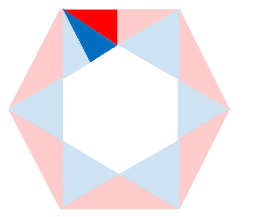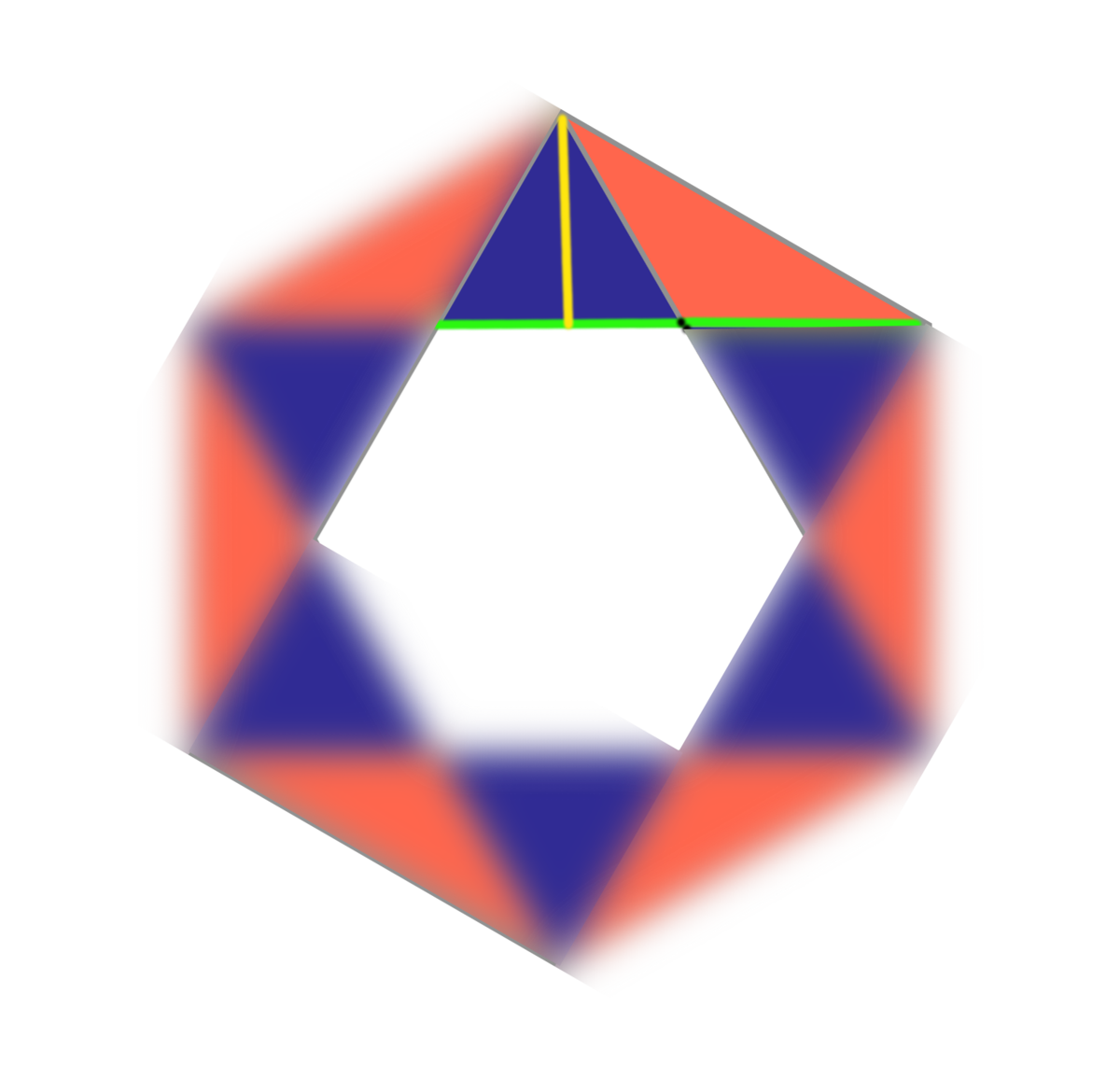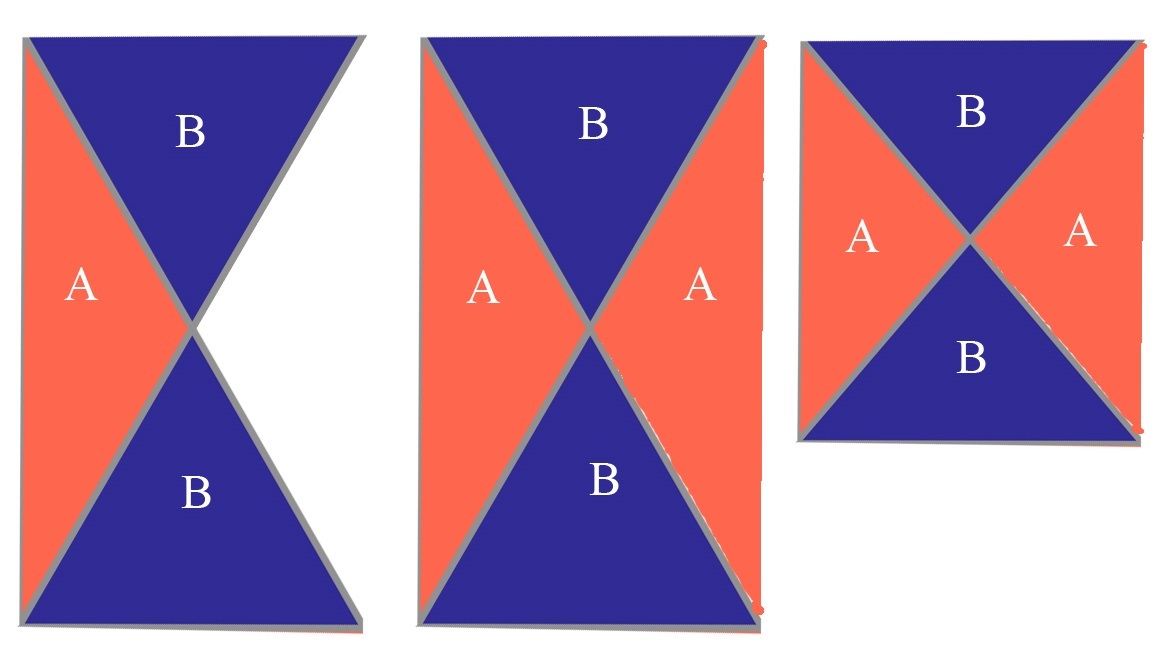Cutting up the Hexagon
The hexagon below is regular. Which of the two colored areas is larger?
This section requires Javascript.
You are seeing this because something didn't load right. We suggest you, (a) try
refreshing the page, (b) enabling javascript if it is disabled on your browser and,
finally, (c)
loading the
non-javascript version of this page
. We're sorry about the hassle.
11 solutions
This is a very clever way to see this. Why did I not see this before!
This is how i saw it too!
awesome, thank you

The small red and blue triangles are congruent because they are both right triangles, share a hypotenuse, and their smallest angle is 3 0 ∘ .
The smallest angle of the blue triangle is half of the internal angle of an equilateral triangle, 2 6 0 ∘ = 3 0 ∘ .
The smallest angle of the red triangle can be calculated from the internal angle of a hexagon, 1 2 0 ∘ , minus internal angle of an equilateral triangle, 6 0 ∘ , (this will give us the total of all both red angles at the vertex) divided by 2 .
2 1 2 0 ∘ − 6 0 ∘ = 3 0 ∘
The blue area is made up of 12 little blue triangles, the red are is made up of 12 little red ones, so the two areas are the same.
..like your thinking.

The two green segments are equal, and the yellow segment is their common height
This is extremely clever way of solving the problem. The triangles look very different, but they have the same base length and same height, so they must have the same area.
This seems like the simplest solution.
Very clever! On an off-topic, blurring the other parts is unnecessary.
If you create a rectangle out of two blue and two red triangles, then the area of one red triangle would be
2
1
X Length X
2
1
X Width, or
4
1
X Length X Width. This is the same for the blue triangles as the base is the width and theheight is half of the length. Therefore the area of the blue triangle is also
4
1
X Length X Width. As there are 6 blue and 6 red triangles, the overall areas are the same.
Consider a blue and an adjacent red triangle. They form one triangle. So the blue and red trinagle have the same height. They also have the same base (as is evident from the other blue triangle). So, they have the same area. There is an equal number of red and blue triangles. Hence, the red and blue areas are equal.
How do you know they have the same base?
Let b represent the length of the longest side of a Orange Triangle, so the base of a Orange Triangle, b O , is equal to b . The height of a Blue Triangle, h B , is needed twice to make up the length of b , so h B = 2 b . The height of the Orange Triangles, h O , is similarly needed twice to make up the length of the base of the Blue Triangles, b B .
Since the area of a triangle is equal to 2 1 b h , the area of the Blue Triangles is equal to 2 1 ∗ b B ∗ h B = 2 1 ∗ b B ∗ ( 2 b ) = 4 b B b
and the area of the Orange Triangles is equal to 2 1 ∗ b O ∗ h O = ( 2 b ) ∗ ( 2 b B ) = 4 b B b
Thus, A B = A O and so 6 ∗ A B = 6 ∗ A O , meaning the colored areas area equal.
Why does the height of a blue triangle is needed twice to make up the length of b ?
Log in to reply
An interesting way to see this was pointed out by Marta Reece above, that the smaller blue triangle formed by cutting the blue triangle in half height-wise is congruent to a smaller orange triangle formed by cutting the orange triangle in half height-wise.
Because these smaller right triangles share a hypotenuse, and their smallest angle is 30 degrees, the little blue triangle's base (the larger blue triangle's height) is equal to the little orange triangle's base, which is half the larger orange triangle's base, or b/2.
A median in a triangle divides it into two triangles with equal areas.
that's true, but what does that mean in this context?
A blue triangle and an orange triangle have the same height and their bases are of equal lengths, so they have equal areas, and thus 6 blue triangles have the same area as 6 orange triangles.
Oh I didn't thought about this method. +1
Another solution.

Everytime A=B
No any number in the question. You can guess the this rule.
I don't follow your logic. Why must A=B?
Let's call a the side of the purple triangle. Now area of each purple triangle is ( 1 / 2 ) a 2 sin ( 6 0 o ) .
Also the area of each orange triangle is ( 1 / 2 ) a 2 sin ( 1 2 0 o ) , which is the same as the purple triangle. And there are 6 each of both orange and purple triangles.
So both equal.
Hmmm, it's not immediately obvious why these colored triangles are isosceles. How did you deduce that they are isosceles first?
Look, there r identical 6 red colored triangles and another identical 6 purple colored triangles. So our destination will be to measure area of each triangle and compare between them. As the base of each red and purple colored triangle are same and also their height. that means area of these triangles are same. so we can finally say are of red =purple.
"As the base of each red and purple colored triangle are same and also their height" Why is this true?